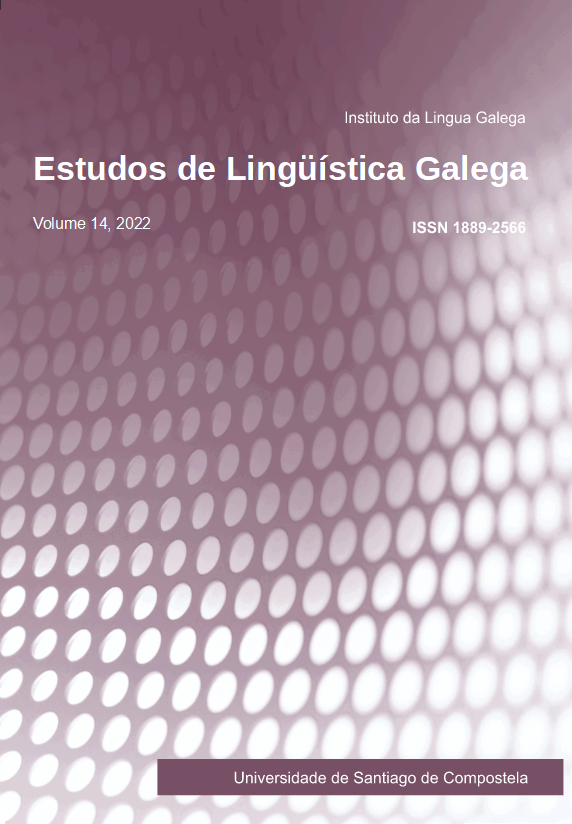Word Order in Portuguese Gerund Clauses: comparing Old Portuguese and Dialectal Portuguese
Main Article Content
Abstract
Differently from the standard contemporary variety of European Portuguese, in which subject-verb inversion is considered categorical in gerund clauses, in Old Portuguese and Dialectal European Portuguese we can find both subject-verb and verb-subject orders in gerund clauses. These variable word orders challenge classical assumptions that correlate word order in gerund clauses with the null subject parameter. Therefore, other factors have to be taken into account. This work investigates the factors that condition subject-verb word order in gerund clauses of Old Portuguese and Dialectal European Portuguese. Corpus data show us that there is a difference in the frequency of subject-verb inversion in both varieties: verb-subject is the predominant word order in Old Portuguese, while subject-verb is the predominant word order in the dialects, regardless of the presence of inflected gerunds. In what concerns the conditioning factors that may trigger one order or the other, we considered the type of verb, the type of subject, and the presence of a connective. In the dialects, regardless of overt inflection, the most important factor for the post-verbal occurrence of the subject is the type of verb. In contrast, in Old Portuguese subject-verb inversion is the dominant pattern and post-verbal subjects can be found with all verb classes. We hypothesize that differences between the two varieties may correlate with the productivity of gerund clauses introduced by a connective, the specification of the C-domain and information-driven movement.
Keywords:
Article Details
References
Ambar, Manuela (1988): Para uma sintaxe da inversão sujeito verbo em português. UL. Doctoral Dissertation. [published 1992. Lisboa: Ed. Colibri].
Barbosa, Pilar (1995): Null subjects. MIT. Doctoral Dissertation.
Barbosa, Pilar (2002): “A propriedade do sujeito nulo e o princípio da projecção alargado”, in Maria Helena Mateus / Clara Nunes Correia (orgs.), Saberes no tempo. Homenagem a Maria Henriqueta Costa Campos. Lisboa: Colibri, 51-71.
Carrilho, Ernestina (2008): “Beyond doubling: overt expletives in European Portuguese dialects”, in Sjef Barbiers et al. (eds.), Microvariation in syntactic doubling. Bingley: Emerald. 301-323. 10.1163/9781848550216_012.
Carrilho, Ernestina / Sandra Pereira (2011): “Sobre a distribuição geográfica de construções sintácticas não-padrão em português europeu”, in Textos seleccionados do XXVI Encontro Nacional da Associação Portuguesa de Linguística. CD-ROM. Lisboa: APL, 125-139.
Costa, João (1998): Word order variation. A constraint-based approach. The Hague: Holland Academic Graphics.
Fiéis, Alexandra (2003): Ordem de palavras, transitividade e inacusatividade. Reflexão teórica e análise do português dos séculos XIII a XVI. Universidade Nova de Lisboa. Doctoral Dissertation.
Fiéis, Alexandra / Maria Lobo (2010) “Aspectos da sintaxe das orações gerundivas no português medieval e no português europeu contemporâneo”, in Ana Maria Brito et al. (eds.), Textos selecionados. XXV Encontro Nacional da Associação Portuguesa de Linguística. Porto: APL, 419-434.
Lobo, Maria (2001): “On gerund clauses of portuguese dialects”, in Alexandre Veiga / Víctor M. Longa / JoDee Anderson (eds.), El verbo. Entre el léxico y la gramática. Lugo: Ed. Tris Tram, 107-118.
Lobo, Maria (2008): “Variação morfo-sintáctica em dialectos do português europeu: o gerúndio flexionado”, Diacrítica 22 (1), 25-55.
Martins, Ana Maria (2002): “The loss of IP-scrambling in European Portuguese: clause structure, word-order variation and change”, in David Lightfoot (ed.), Syntactic effects of morphological change. Oxford/NY: Oxford University Press, 232-248. DOI:10.1093/acprof:oso/9780199250691.003.0013.
Martins, Ana Maria (2011): “Scrambling and information focus in old and contemporary Portuguese”, Catalan Journal of Linguistics 10, 1-26.
Mota, Maria Antónia (1997): “Les traits nombre et personne/nombre en portugais - l’oral dans ses variétés”, in Mireille Bilger / Karel van den Eynde / Françoise Gadet (eds.), Analyse linguistique et approches de l’oral. Recueil d’études offert en hommage à Claire Blanche-Benveniste (Orbis, Supplementa 10). Louvain-Paris: Peeters, 339-345.
Rizzi, Luigi (1982): Issues in Italian syntax. Dordrecht: Foris.
Roberts, Ian (1994): “Two types of head movement in Romance”, in David Lightfoot / Norbert Hornstein (orgs.), Verb movement. Cambridge: Cambridge University Press, 207-242. https://doi.org/10.1017/CBO9780511627705.012.
Santos, Ana Lúcia (1999): O particípio absoluto em português e em outras línguas românicas. UL. Master Dissertation.






